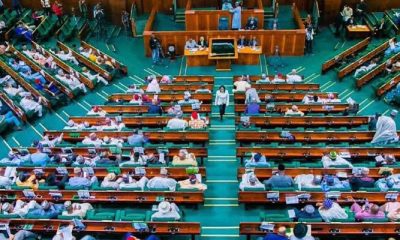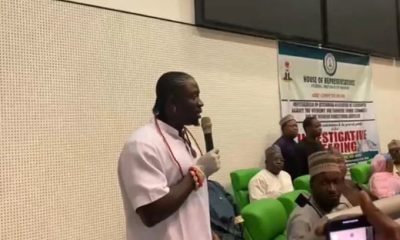
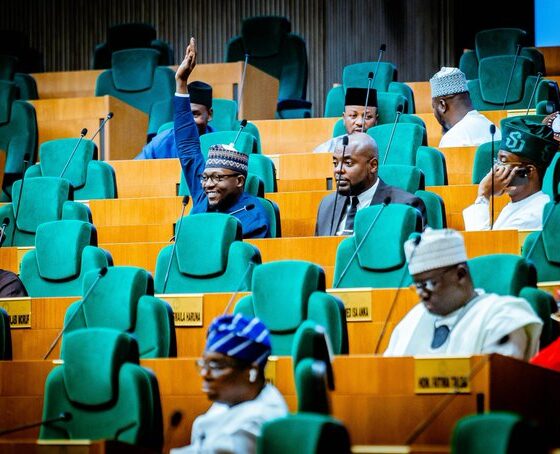
News
House of Reps push for 6 months imprisonment, N100,000 fine on non-voting citizens
The House of Representatives has passed through Second Reading a bill seeking to impose six months imprisonment or N100,000 fine on non-voting citizens in the general elections.
The private member bill which seeks to amend the Electoral Act, 2002 was sponsored by Speaker Abbas Tajudeen and Hon. Daniel Ago, seeks to make it mandatory for Nigerians of maturity age refuse to vote in all national and state elections and for related matters.
The proposed bill seeks to amend the provisions of Sections 9(1), 10(1), 12(1b), and 47.
Clause 2 of the bill seeks to amend Section 9 of the Principal Act by substituting for Section 9(1a), a new Section 9(1a) which states that: “The Commission shall compile, maintain, and update, on a continuous basis, a National Register of Voters (in this Act referred to as ‘the Register of Voters’) which shall include the names of all persons (a) who have attained the maturity age of 18 and are entitled to vote in any Federal, State, Local Government or Federal Capital Territory Area Council election; and’
“Clause 5 of the bill also seeks to amend Section 47 by inserting a Sub-Section 47(4) after Sub-Section 47(3).
“Section 47(4a) of the Electoral Act 2022 It shall be mandatory for all registered voters who ha e attained the Majority Age of 18 and above to vote in all National and State Elections.”
ALSO READ: Man sentenced to seven years for exploiting teenage girl in Kano
“(b) A person who has attained the Majority Age of 18 years who refuses to perform his civic duty to vote commits an offence and is liable on conviction. to a fine not more than N100,000 or imprisonment for a term not more than six months.”
READ ALSO
- Odumodublvck Faces Off with Blaqbonez’s Manager as Nigerian Rap Feud Escalates
- Mason Greenwood Nets Four Goals in Marseille’s 6-2 Ligue 1 Triumph Over Le Havre
- Arsenal Reclaims Premier League Lead with 1-0 Win Over Fulham
- Cristiano Ronaldo’s Stunning Equalizer Powers Al Nassr’s 5-1 Win Over Al-Fateh
- Defence HQ Denies Coup Attempt, Says Independence Anniversary Cancellation Not Linked to Any Plot
According to the explanatory memoradum of the bill, it seeks to remedy the large scale apathy to performing a vital civic duty in electing Nigerian leaders. The percentage of Registered Voters that present themselves for actual voting is abysmally low and requires parliamentary attention.
In his lead debate, Hon. Ago expressed the need to address the persistent issue of low voter turnout in Nigeria’s electoral process and strengthen democratic participation.
While describing voting as both a right and civic duty, Hon. Ago harped on the need for active citizens’ engagement is vital for any thriving democracy.
He noted that making voting mandatory would reduce apathy and increase political inclusiveness.
However, several lawmakers across party lines, including Hon. Awaji-Inombek Abiante, Hon. Mark Esset and Hon. Ghali Mustapha expressed grave concerns over the feasibility of enforcing compulsory voting.
The lawmakers expressed worry on the implementation of the legislation, the integrity of the voter register, especially in rural and conflict-prone areas and whether it would be fair to penalize citizens in a system where electoral outcomes are often disputed.
The lawmakers also alleged that the bill poses a breach on individual freedom and the risk of forced participation in the electoral processes.
Meanwhile, the Deputy Speaker Hon. Benjamin Kalu and Hon. Akarachi Amadi who spoke in support of the proposed legislation argued that mandatory participation would deepen civic engagement and ownership of Nigeria’s democracy.
In his intervention, Speaker Tajudeen argued that the proposed bill would deepen Nigeria’s democratic culture and compel citizens to take ownership of the nation’s leadership selection process.
When the Speaker put the voice vote, despite the overwhelming ‘nay’ voice vote against the ‘Aye’, Speaker Tajudeen ruled in favour of the few lawmakers who supported the bill and referred the bill to the House Committee on Electoral Matters for further legislative action.
Follow BONA NAIJA for more
News
Defence HQ Denies Coup Attempt, Says Independence Anniversary Cancellation Not Linked to Any Plot

The Defence Headquarters (DHQ) has dismissed as false and misleading reports suggesting that the cancellation of activities marking Nigeria’s 65th Independence Anniversary was connected to an alleged attempted military coup.
In a statement on Sunday, the DHQ clarified that there was no coup attempt or any plan to destabilize the country, describing the report as a fabrication aimed at causing unnecessary panic among citizens.
“The Defence Headquarters wishes to state categorically that the report linking the cancellation of activities marking Nigeria’s 65th Independence Anniversary to an alleged attempted military coup is false and misleading,” the statement read in part.
The military urged members of the public to disregard the rumor and cautioned media organizations and social media users against spreading unverified information capable of undermining national security.


The statement reaffirmed the Armed Forces’ unwavering loyalty to the Constitution and commitment to democratic governance under President Bola Ahmed Tinubu.
Follow BONA NAIJA for more
Business
Unity Bank Corpreneurship Challenge Empowers 578 Young Entrepreneurs, Awards ₦16 Million to 30 New Winners

No fewer than 578 young entrepreneurs across Nigeria have benefitted from Unity Bank’s Corpreneurship Challenge the Bank’s flagship entrepreneurial development initiative launched a few years ago.
Over this period, the Bank has invested in supporting budding entrepreneurs across multiple sectors to start businesses, create jobs, and contribute to Nigeria’s economic growth.
The ongoing initiative recently produced 30 new winners, who received a total grant of ₦16 million during the Batch B, Stream II edition of the National Youth Service Corps (NYSC) orientation course, held across 10 states of the federation.
The winners, innovative young entrepreneurs developing solutions across various value chains such as fashion design, bag making, pastry and beverage production, event management, and vegetable farming, emerged after pitching their business ideas during the challenge at NYSC Orientation Camps in Lagos, Delta, Kaduna, Jigawa, Kwara, Benue, Abia, Kogi, Rivers, and Plateau States.
At the NYSC Orientation Camp in Ipaja, Lagos State, Fiyinfoluwa Titilayo Ojo, who pitched a soap-making enterprise, emerged the overall winner to clinch the ₦800,000 grand prize. Ndukwe Chiamaka Joan, with her innovative Small Chops business proposal, claimed ₦500,000 as first runner-up, while Barakat Modinat Olamide secured ₦300,000 to support her beverage-making venture.

Expressing her excitement after emerging as the overall winner in Lagos, Fiyinfoluwa Titilayo Ojo described the experience as life-changing, stating, “I’m truly grateful to Unity Bank for this opportunity. Winning the Corpreneurship Challenge has given me the push and confidence I needed to scale my soap-making business. Beyond the grant, the experience taught me how to structure my business better and believe in its potential. It’s amazing to see a bank that genuinely invests in young people’s dreams.”
Across the remaining nine states, 27 other winners also emerged after pitching diverse business ideas ranging from fish and poultry farming to printing, piggery, and cake production.
Over the past six years, the Unity Bank Corpreneurship Challenge has become an integral part of the NYSC programme, aligning with the Federal Government’s drive to upskill young graduates and promote entrepreneurship amid the scarcity of white-collar jobs. Each edition attracts thousands of entries from corps members whose business plans are evaluated for originality, marketability, job creation potential, and overall business acumen.
Speaking during the grand finale in Lagos, Unity Bank’s Divisional Head, Retail & SME, Mrs. Adenike Abimbola, reaffirmed the Bank’s commitment to empowering Nigerian youth through enterprise. She said:
“At Unity Bank, we believe that the energy and creativity of young Nigerians are vital to the nation’s economic transformation. The Corpreneurship Challenge is our way of nurturing this potential — by giving corps members the financial boost, mentorship, and confidence to turn their ideas into thriving businesses. Seeing over 578 young entrepreneurs already impacted motivates us to keep expanding the initiative and deepening our support for the SME ecosystem.”
The Corpreneurship Challenge has earned Unity Bank national recognition for its role in youth empowerment and job creation, attracting over 2,000 applicants per edition.
In partnership with the NYSC Skill Acquisition and Entrepreneurship Development (SAED) programme, the initiative continues to serve as a launchpad for youth-owned enterprises, offering grants of up to ₦800,000 to help corps members turn their business dreams into reality.
Follow BONA NAIJA for more
News
16 Nigerian Military Officers Arrested Over Alleged Coup Plot to Oust President Tinubu
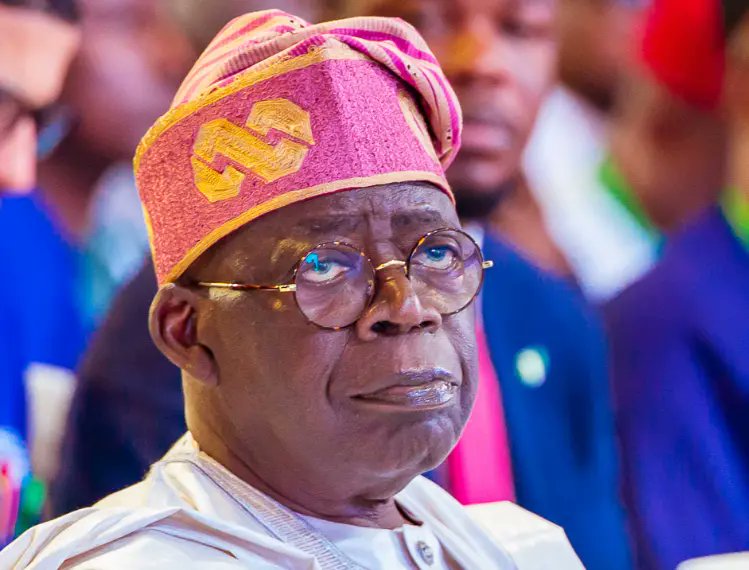
At least sixteen senior military officers have been arrested by the Nigerian Armed Forces over an alleged plot to overthrow President Bola Tinubu’s administration, according to top security sources.
According to Sahara Reporters Although the military publicly described the arrests as disciplinary actions linked to “failure in promotion examinations” and “career stagnation,” insiders told reporters the detained officers were accused of planning a coup d’état.
The Director of Defence Information, Brigadier General Tukur Gusau, confirmed the arrests but said they followed a “routine military exercise,” citing “indiscipline and breach of service regulations.”
However, intelligence gathered by the Defence Intelligence Agency (DIA) allegedly uncovered a plot led by a Brigadier General to “seize power from selfish politicians.” The officers, ranging from Captains to senior commanders, were reportedly picked up at various military formations across the country.
Sources added that the October 1 Independence Day parade was abruptly cancelled after authorities discovered the conspirators planned to strike during the ceremony, allegedly targeting the President and other top officials.
The detained officers are currently being held at the DIA facility in Abuja pending further investigation.
Nigeria has witnessed five successful coups since gaining independence in 1960. Analysts warn that rising reports of corruption, low morale, and political interference within the armed forces have continued to fuel discontent among some military personnel.
Follow BONA NAIJA for more
News
I will be receiving some notable figures from the ADC. – APC National Chair, Yilwatda.

Next week, I will be receiving some notable figures from the ADC. – APC National Chairman, Yilwatda.
Professor Nentawe Yilwatda, the National Chairman of the All Progressive Congress (APC), has announced that several politicians from opposing parties are planning to join the ruling APC soon.
During a meeting with Plateau APC stakeholders held at Crest Hotel in Jos yesterday, Yilwatda shared this.
He said, “Next week, I will be receiving some notable figures from the ADC.
“Some of those who had defected from PDP have reached out to ADC and are now returning to APC. Many of them have completed their ‘medicals’ and will be officially unveiled next week.
“In another two weeks, we will unveil yet another big figure who just finished his own ‘medicals.’
“He tried to unveil himself the day before yesterday, you probably saw it in the news. But officially, we’ll be receiving him soon. More people are coming. More senators are joining; more governors, more members of the National Assembly. The APC is the bride of the moment.
“Thank you so much for all you did—from the very beginning of my loss, through the burial, and even after.May God bless and reward you richly. I must also extend my deepest gratitude for how you stood your ground when we faced the setback at the Supreme Court.
“Many people thought that was the end of APC on the Plateau; that we had been buried politically. But what they didn’t see was the seed that had already been sown.
That seed germinated, and today, APC is stronger, more vibrant and growing bigger by the day.
“I’d also like to take this opportunity to warmly welcome our new members.”
Abia State
2027: Prepare Your Will If You Plan to Write Election Results in Abia — Governor Alex Otti Warns
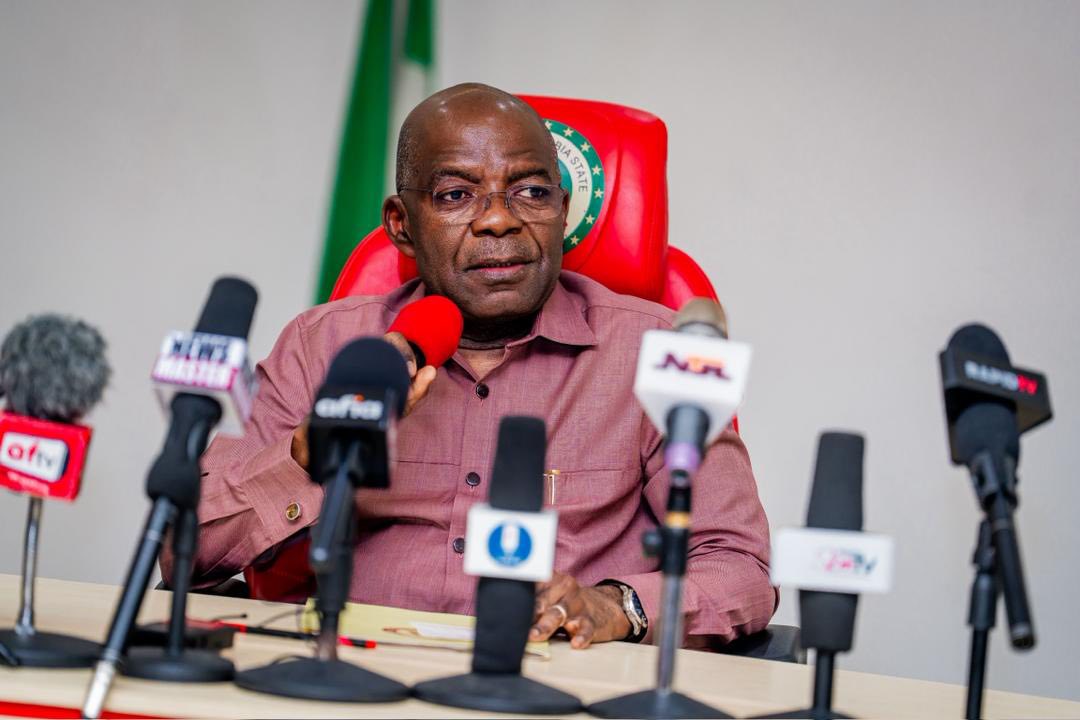
Abia State Governor, Dr. Alex Otti, has cautioned individuals plotting to manipulate the 2027 governorship election results to first “write their wills” before embarking on such a dangerous mission.
Speaking during his monthly media chat in Umuahia, the governor emphasized that his statement was not a threat but a caution informed by intelligence reports suggesting that some displaced politicians are boasting about plans to “write” election results in 2027.
“This is not a threat but a warning. If you are planning to write election results in Abia, please write your will first,” Otti declared.
He dismissed remarks attributed to the Deputy Speaker of the House of Representatives, Rt. Hon. Benjamin Kalu, noting that power ultimately belongs to God.
“I do not have the anointing to speak about what will happen in 2027 in 2025. But I know that power belongs to God, and He gives it to whom He wants. We should not speak when the Lord has not spoken,” he said.
Governor Otti advised Kalu to focus on his duties at the National Assembly, adding that there was no animosity between them despite the Deputy Speaker’s repeated public criticisms.
“My relationship with the Deputy Speaker didn’t start with politics. This is the second time he has publicly attacked my administration. I forgive him, but I think he suffers from what I call ‘Information Deficiency Syndrome.’”
He further clarified that according to the Protocol Act of 2000, the sixth position in Nigeria’s political hierarchy belongs to the Deputy Senate President, not the Deputy Speaker.
On Governance and Infrastructure
Governor Otti commended the Abia State Environmental Protection Agency (ASEPA) for its consistent efforts in maintaining a cleaner environment across Aba, Umuahia, and Ohafia.
“We are now moving to the next phase of waste management — recycling and turning waste into wealth,” he said, disclosing ongoing engagements with investors and institutions to actualize the plan.
The governor also announced progress in reviving key moribund industries, including Star Paper Mill, Aba Textile Mill, and Modern Ceramics, through collaborations with the Asset Management Corporation of Nigeria (AMCON) and other stakeholders.
“Government is an enabler. Our goal is to revive these industries, hand them to professionals to run as private entities, and create jobs for our people,” Otti stated.
Education and Health
Governor Otti reaffirmed his administration’s commitment to transforming the education sector, revealing that over 5,395 new teachers have been deployed across the state, with plans to recruit an additional 4,000 due to rising enrollment.
He also highlighted improvements in healthcare delivery, including the reconstruction of general hospitals and recruitment of over 774 healthcare professionals, with applicants coming even from other African countries.
“We are building a health system powered by renewable energy to ensure every community has access to quality healthcare,” he said.
Power and Infrastructure Expansion
Governor Otti announced the installation of nearly 8,000 solar-powered streetlights across the state and ongoing projects aimed at achieving steady electricity supply in Aba, Umuahia, Bende, and Ohafia.
“When Aba Power reaches its full capacity of 188 megawatts, excess power will be distributed to Umuahia and other parts of the state. Light brings development, and darkness disappears where there is light,” he said.
He disclosed that President Bola Tinubu’s representative, Senator Dave Umahi, recently commissioned eight newly completed roads in Abia, with more infrastructure projects including the 25km Umuahia–Ikot Ekpene Road and Ihechiowa Ring Road set to begin soon.
On Defection Rumours
Governor Otti debunked speculations about plans to defect to the All Progressives Congress (APC), stating that he remains committed to his principles.
“You don’t take decisions simply because others are taking them. We are not people who follow the crowd,” he affirmed.
Follow BONA NAIJA for more
-

 Entertainment2 weeks ago
Entertainment2 weeks agoBig Brother Naija Live Update: KOLA, SULTANA Evicted #BBNaija
-

 Music3 weeks ago
Music3 weeks agoOdumodublvck Drops “Industry Machine” Feauturing Wizkid Ahead of 23-Track Album
-

 Entertainment2 weeks ago
Entertainment2 weeks agoImisi Crowned Winner of Big Brother Naija Season 10
-

 Biafra3 weeks ago
Biafra3 weeks agoJudgement Day: Tension in Abuja as Court Rules on Nnamdi Kanu’s No-Case Submission Today
-

 Music News2 weeks ago
Music News2 weeks agoOdumodublvck Set to Drop ‘Industry Machine’ The Album Featuring Davido, Wizkid, Skepta & Stormzy
-

 Music3 weeks ago
Music3 weeks agoSarz Drops Debut Album Featuring Wizkid, Asake, Skillibeng
-

 Music3 weeks ago
Music3 weeks agoSpyro Releases Debut Album The Men, The Boys & Your Guy
-

 News2 weeks ago
News2 weeks agoFirst Lady, Oluremi Tinubu Celebrates World Teachers’ Day 2025
-

 Music News3 weeks ago
Music News3 weeks agoNigerian singer Peruzzi to release new single “Die It” at midnight
-

 Entertainment3 weeks ago
Entertainment3 weeks agoVIDEO: AYRA STARR & REMA SHUT DOWN GLOBAL CITIZEN FESTIVAL 2025





